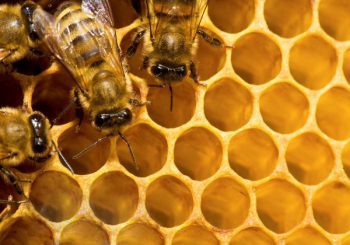By Amelia Harris
Staff Writer for Wake Up World
Scientists from Western University and Lawson Health Research Institute in Ontario are exploring how probiotics affect the health of honey bees. They published a study in the Nature journal ISME J showing that probiotics may boost honey bees’ ability to recover from hive-wide bacterial infestations. (1)
[pro_ad_display_adzone id=”110028″]
Honey bees hold global importance with their contributions of honey production and crop pollination. But they are increasingly threatened by both viruses and bacteria that infect their hives. This research team’s previous work also points to the use of pesticides as a cause of decreased immunity among bees. (1)
Probiotics and Hive Well-Being
Probiotics are beneficial bacteria that humans sometimes use to enhance their digestive health. They are found in fermented foods and can also be taken as supplements. (2)
Researchers chose to study how probiotics might enhance honey bees’ health. They used a ‘BioPatty’ that supplements the bees’ food to administer probiotics to the bees in their experimental apiaries. Other bees received a BioPatty without probiotics, and some bees did not receive anything. (1)
“Probiotics aren’t just for humans,” Gregor Reid, Ph.D., told Science Daily. Reid is a Professor at Western’s Schulich School of Medicine & Dentistry and Endowed Chair in Human Microbiome and Probiotics at Lawson. “Our idea was that if you could use beneficial microbes to stimulate the immune response or attack the pathogens that are infecting the hives, then maybe we can help save the bees.” (1)
Hive Diseases
During the experiment, their hives became infected with American Foulbrood. This is a common hive disease caused by the bacterium Paenibacillus larvae. It forms spores, which can easily spread between hives weakening and killing bee colonies. (1, 3)
“Bee colonies are really interesting little microcosms of biology. There are lots of individual bees, but they are all genetically related and they are living in a close confined space,” Graham Thompson, Ph.D., said to Science Daily. Thompson is an Associate Professor in the Faculty of Science at Western who studies the biology and social behavior of bees. “They are all very susceptible to contagious disease, and they are demographically disposed to outbreaks.” (1)
Increased Survival with Probiotics
The bees who received probiotics via BioPatty had a significantly increased survival rate with the American Foulbrood outbreak. And their pathogen load decreased by 99%. Researchers studied some of the bees in the lab, and the ones with probiotics had an increased immunity to the bacteria that causes American Foulbrood. (1)
Interestingly, the bees who received just the BioPatty without the probiotic were the most affected by the disease. Since even the bees who received nothing at all had better outcomes with American Foulbrood, the researchers believe that supplementing bees’ food supply may cause pathogens to spread. This is a common practice that may need to be reconsidered. (1)
“Long-term we hope to add a viable, practical and available treatment alternative to chemicals and antibiotics that beekeepers can readily adopt into their bee-keeping habits to help prevent colony collapse,” Thompson said to Science Daily. (1)
Article sources:
- https://www.sciencedaily.com/releases/2019/10/191030132715.htm
- https://nccih.nih.gov/health/probiotics/introduction.htm
- https://beeaware.org.au/archive-pest/american-foulbrood/#ad-image-0
About the author:
Amelia Harris is a writer and eco-activist, interested in health and all things esoteric, with a passion for sharing good news and inspiring stories. She is a staff writer for Wake Up World.
[pro_ad_display_adzone id=”110027″]







